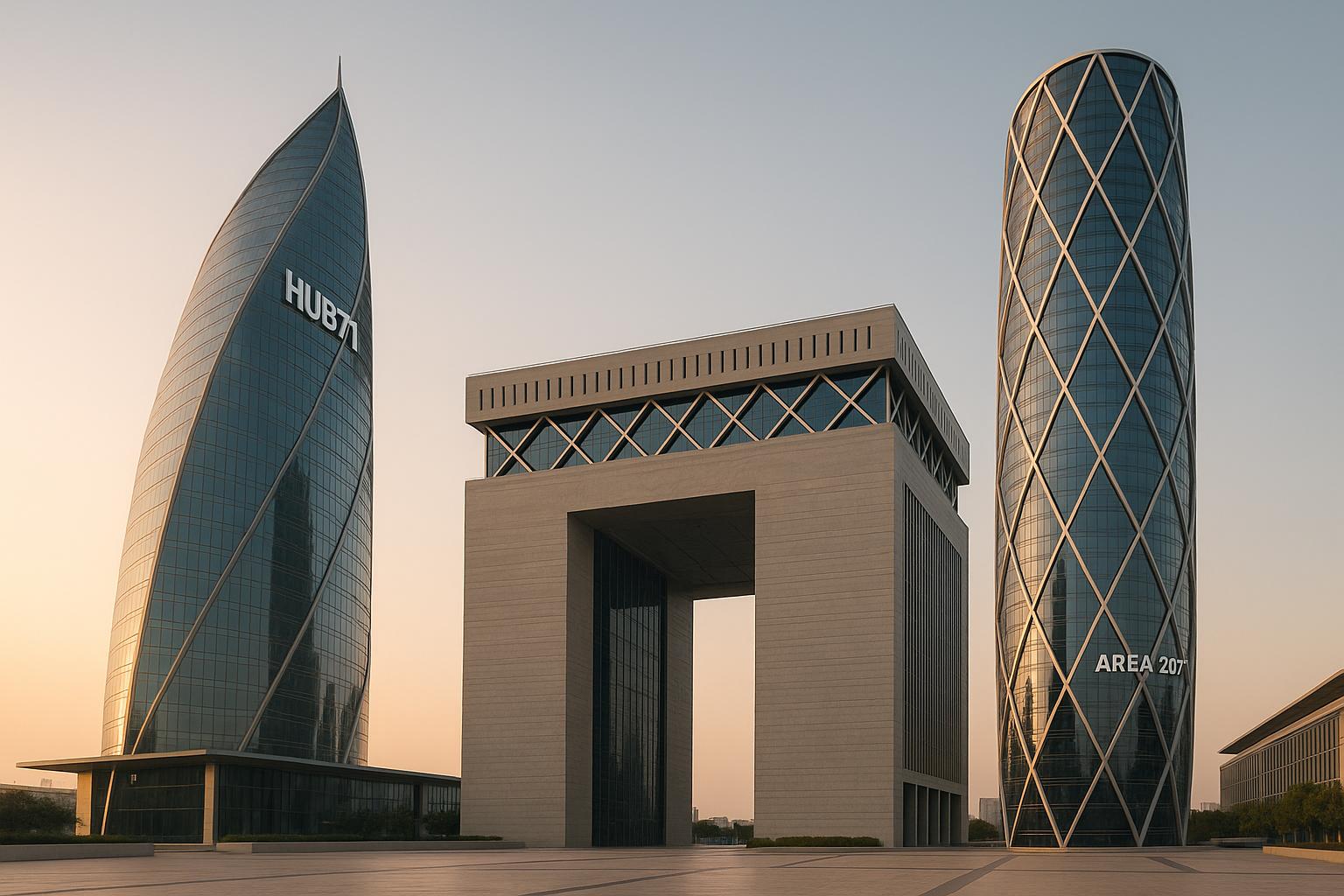
When deciding between Hub71, DIFC FinTech Hive, and Area 2071 for your startup, it boils down to sector focus, funding, and programme structure:
Quick Comparison:
| Factor | Hub71 | DIFC FinTech Hive | Area 2071 |
|---|---|---|---|
| Funding | AED 250,000–750,000 (cash + in-kind) | $20,000 (~AED 73,400) (non-equity) | Minimal public data |
| Equity | Required (via SAFE note) | Not required | Not disclosed |
| Sector Focus | Tech (AI, fintech, healthtech, etc.) | Fintech, insurtech, regtech | Future-focused industries |
| Programme Structure | Structured accelerator | Structured, sector-specific | Informal, unstructured |
| Location | Abu Dhabi (ADGM) | Dubai (DIFC) | Dubai |
Recommendation: Choose Hub71 for broader tech focus and significant funding, DIFC FinTech Hive for fintech-specific support without equity trade-offs, and explore Area 2071 only if its informal setup aligns with your needs.
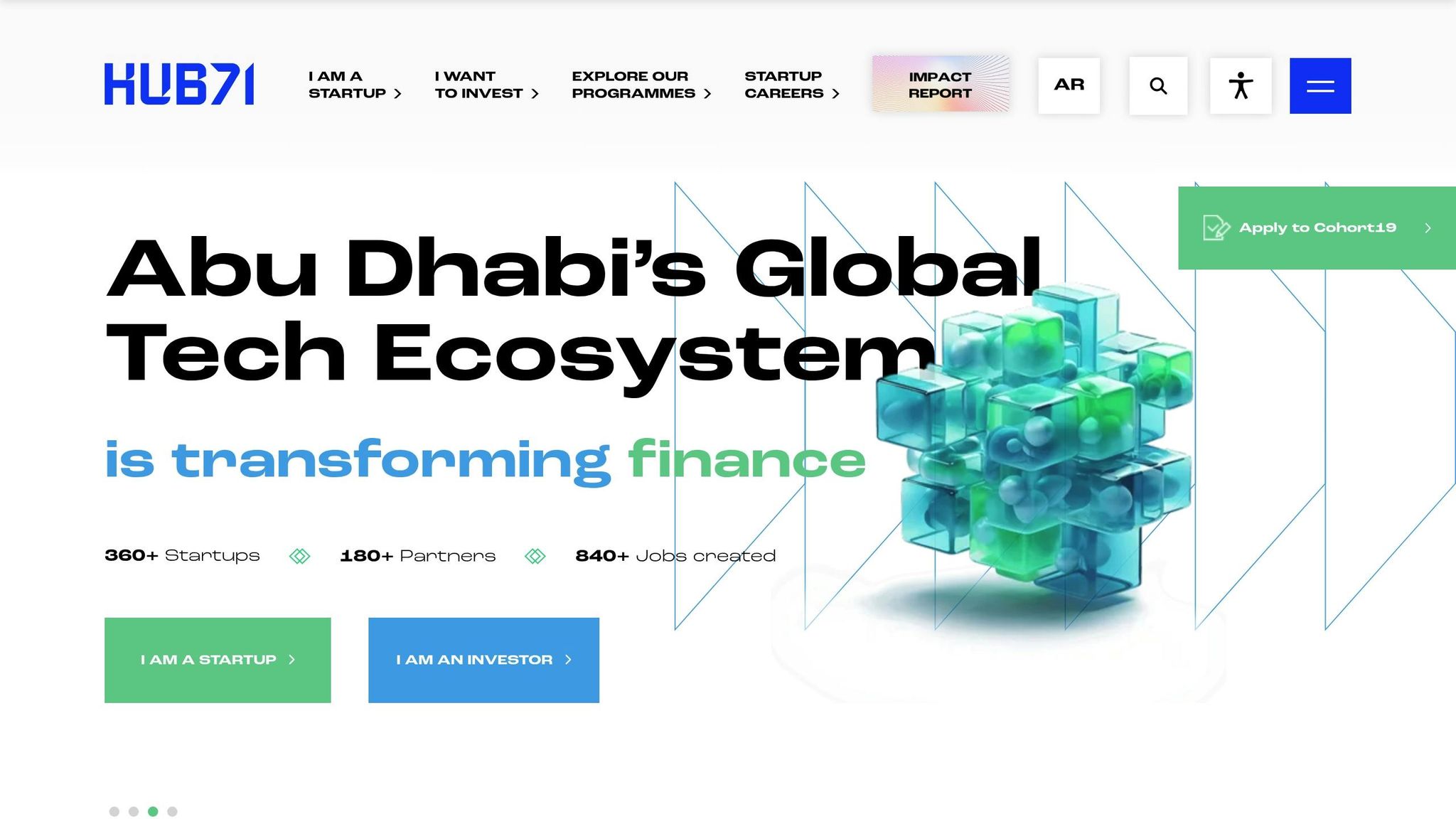
Hub71, located in Abu Dhabi Global Market (ADGM) on Al Maryah Island, serves as a hub for startups, connecting them with key government, corporate, and investor networks to help them thrive.
Hub71 operates from a cutting-edge facility designed to encourage collaboration and creativity. It offers co-working spaces, meeting rooms, and event areas, all built to support networking and innovation. With its favourable regulatory environment, Hub71 provides international entrepreneurs with a strategic base to grow and expand their ventures.
The platform focuses on a range of industries, including AI, blockchain, cybersecurity, fintech, healthtech, and mobility. Startups that align with national economic priorities are given special attention, reflecting Hub71’s commitment to supporting the UAE’s growth agenda.
Hub71 provides a variety of resources to empower startups, including:
Startups at Hub71 gain access to a well-connected network of industry experts and international partners. The programme also supports talent acquisition by offering visa assistance, ensuring businesses can attract and retain the right people. Additionally, Hub71 carefully selects startups that align with its vision for growth, ensuring a mutually beneficial partnership.
To qualify, startups must be in the early or growth stages, have a market-tested product, and boast a strong founding team. The application process involves an online submission, a thorough review, and a pitch session to demonstrate the business’s potential.
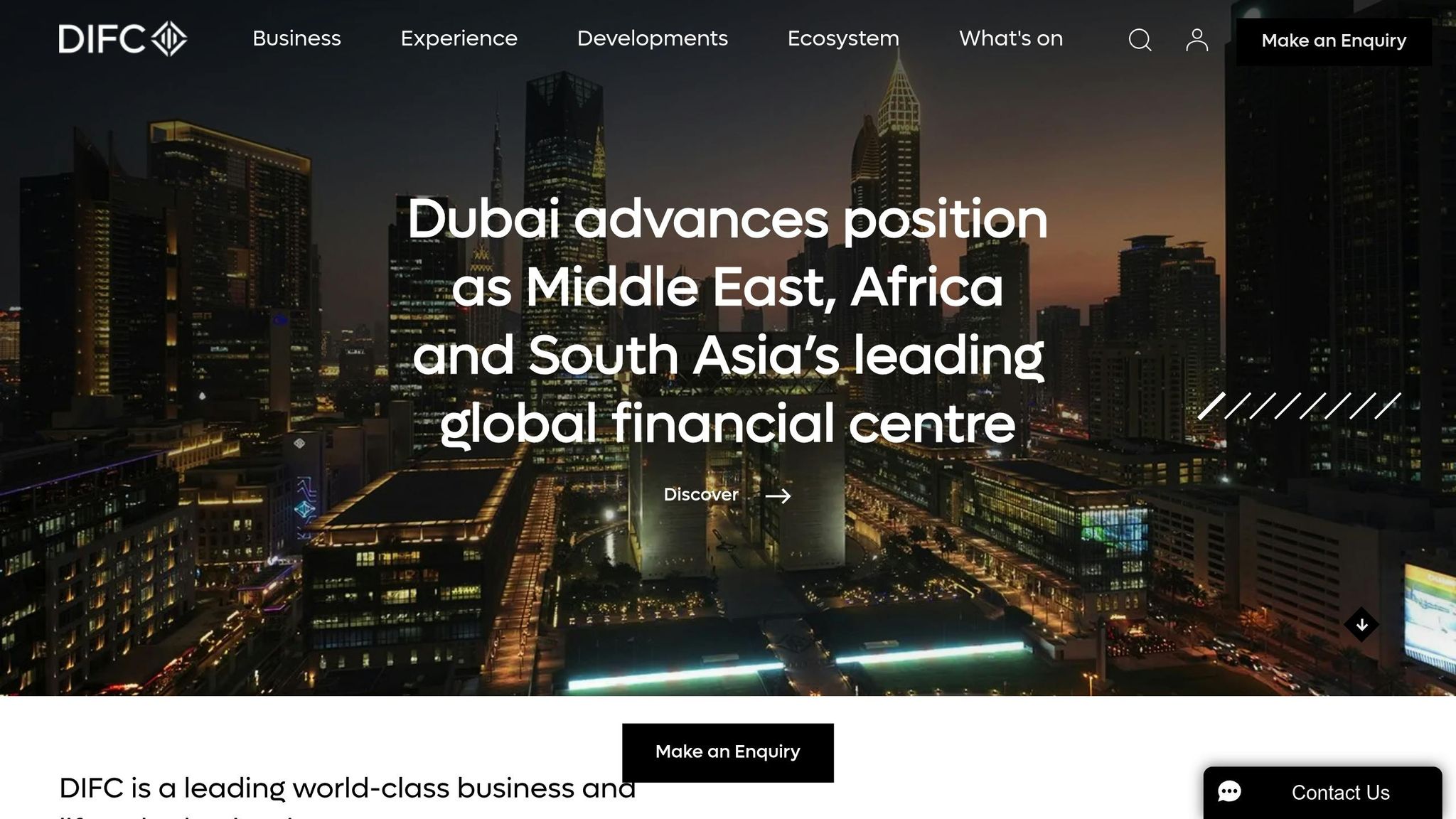
DIFC stands out as the Middle East's leading financial hub, offering a specialised accelerator programme designed for fintech and financial services startups.
Located in the heart of Dubai's financial district, DIFC provides startups with direct access to key players in the financial ecosystem, including major banks, investment firms, and regulators. Its state-of-the-art facilities feature modern co-working spaces, meeting rooms, and networking areas, all strategically positioned to connect startups with potential clients, partners, and investors. This central location ensures startups are right where the action is, surrounded by opportunities to grow and thrive.
The DIFC accelerator exclusively supports the fintech and financial services sectors, covering areas like digital banking, insurtech, regtech, wealthtech, and Islamic finance solutions. Startups that address the specific needs of the MENA region, such as Sharia-compliant financial products or cross-border payment systems, are particularly encouraged to apply. This targeted focus allows the programme to provide tailored support and resources for these specialised fields.
The DIFC accelerator equips startups with a range of resources tailored to the financial services industry:
Startups participating in the programme gain immediate access to a network of over 500 financial institutions, making it easier to connect with enterprise clients and shorten the often lengthy B2B sales process. DIFC also provides crucial guidance on regulatory compliance, ensuring startups can meet the stringent requirements of the financial industry.
The credibility and established reputation of DIFC within the financial sector further enhance startups' ability to build trust with potential clients and investors, giving them a significant edge in a competitive market.
DIFC targets startups with a minimum viable product specifically designed for the financial services sector. Applicants must demonstrate a strong understanding of regulatory frameworks and show potential for scaling within the MENA region. The selection process involves a thorough application review and presentations to a panel of industry experts and DIFC representatives. Startups with early traction, such as partnerships with financial institutions or pilot programmes with enterprise clients, are given priority in the selection process.
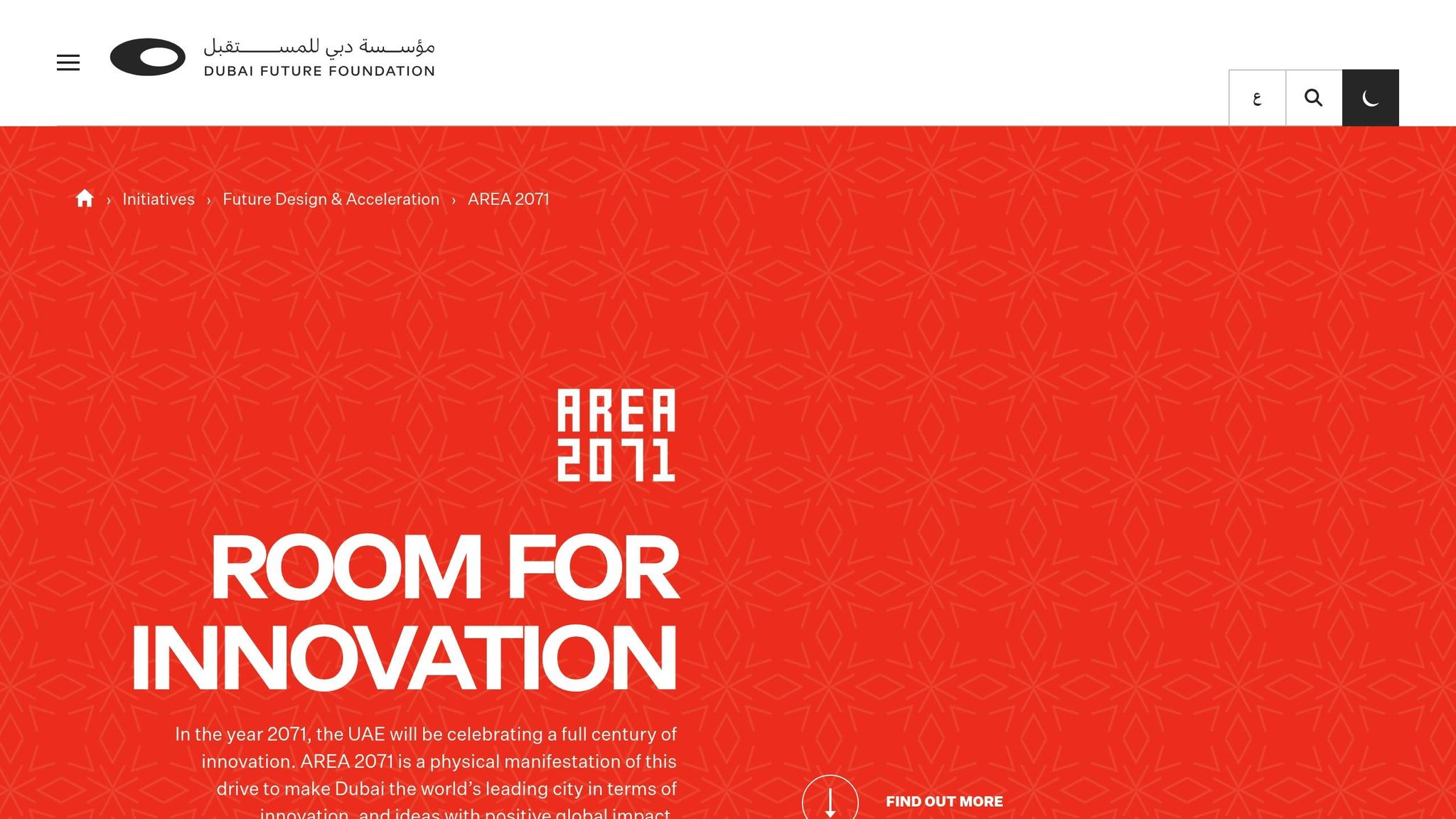
Unlike Hub71 or DIFC, Area 2071 does not run a dedicated pre-seed accelerator programme. Instead, it's positioned as Dubai's future economy district, aiming to drive innovation as part of the UAE's broader economic diversification strategy. This unique focus sets it apart from other startup hubs.
Rather than offering a structured accelerator programme, Area 2071 contributes to the innovation ecosystem through corporate partnerships, events, and initiatives. These opportunities are less formal but still provide a platform for entrepreneurs to connect, collaborate, and explore.
For pre-seed founders, Area 2071's unconventional approach requires a different mindset. Startups looking for structured mentorship, funding, or comprehensive support may need to explore other programmes. While the district's emphasis on future-focused industries can open doors, those needing hands-on guidance should consider established accelerators.
Dubai's startup ecosystem continues to grow, and Area 2071 might expand its offerings over time. For now, early-stage entrepreneurs should prioritise programmes with clear structures and proven support systems to help them build a strong foundation.
Every accelerator has its own strengths and challenges, which can significantly shape the trajectory of your startup. It's crucial to evaluate these elements in relation to your business goals and needs.
Hub71 stands out with its substantial financial backing for tech startups. The programme offers AED 250,000 in cash, along with an equivalent amount in in-kind services, such as housing, health insurance, and office space. Additionally, there's a potential top-up of AED 250,000, bringing the total support to AED 750,000[1][2][3]. Hub71 caters to a wide range of sectors, including fintech, AI, SaaS, and healthtech, and provides access to over 40 capital partners and a network of 150+ general partners[3]. However, this support comes with a trade-off: founders are required to offer an equity stake through a SAFE note. This balance of resources and equity makes Hub71 appealing for startups aiming for growth with substantial backing.
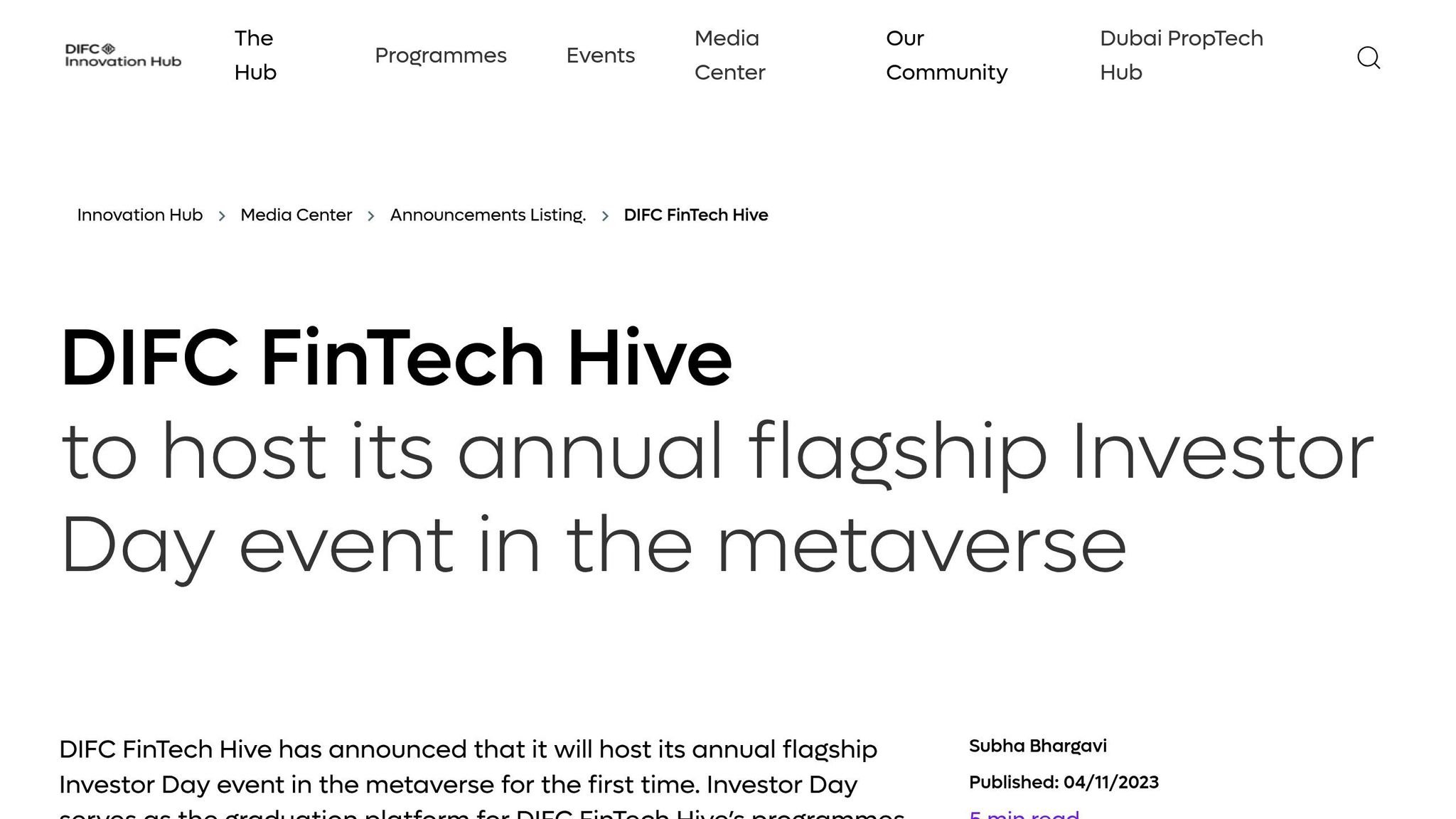
DIFC FinTech Hive is tailored for startups in the financial technology space. It offers $20,000 (around AED 73,400) in non-equity funding, along with a benefits package[1][2]. The programme focuses on creating sector-specific connections, linking startups with banks, venture capitalists, and regulators. It also provides regulatory guidance and opportunities to pilot projects with banks[1]. While this targeted approach is excellent for fintech, insurtech, and regtech startups, it may not meet the needs of founders requiring larger initial funding[1][2][4]. Additionally, its narrow sector focus sets it apart from the broader support offered by Hub71.
Unlike the structured programmes of Hub71 and DIFC FinTech Hive, Area 2071's offerings remain less transparent. While it is recognised as a key player in Dubai's economic landscape, specific details about its accelerator programmes, funding options, and support systems for pre-seed startups are not widely available. More information is needed to fully assess its potential.
| Factor | Hub71 | DIFC FinTech Hive | Area 2071 |
|---|---|---|---|
| Funding | AED 250,000 cash + AED 250,000 in-kind (potential top-up up to AED 250,000)[1][2][3] | $20,000 (≈ AED 73,400) non-equity funding plus benefits[1][2] | Minimal public data |
| Equity | Yes (via SAFE note)[1][2][3] | No | Not specified |
| Sector Focus | Fintech, AI, SaaS, Healthtech[1][2] | Fintech, Insurtech, Regtech[1][2][4] | Not disclosed |
| Network Access | 40+ capital partners; 150+ general partners[3] | Direct connections to banks, VCs, and regulators[1] | Minimal public data |
| Programme Structure | Structured accelerator programme[1][2][3] | Sector-focused, structured programme[1][2] | Not disclosed |
Choosing the right accelerator depends on what your startup values most. Hub71 is a strong contender for those needing significant funding and multi-sector support, while DIFC FinTech Hive is an excellent choice for fintech startups seeking focused, non-equity assistance. For Area 2071, further investigation is necessary to understand its offerings better.
To help you navigate the options outlined earlier, here are some key recommendations to guide your decision-making process. Carefully evaluate each accelerator based on factors like funding, equity requirements, sector alignment, and location.
DIFC FinTech Hive is ideal for startups in fintech, insurtech, and regtech. It offers non-dilutive funding of USD 20,000 (approximately AED 73,400) and provides direct access to financial institutions and regulators - a great opportunity for businesses aiming to establish a strong foundation in the financial sector.
For startups in broader tech industries - such as AI, SaaS, healthtech, life sciences, digital assets, and climate tech - Hub71 stands out. It offers a mix of cash and in-kind support totalling AED 500,000, with the possibility of an additional AED 250,000. However, this funding comes with an equity component through a SAFE note. Hub71’s programmes range from 12 weeks to two years, making it a flexible choice for long-term growth. Its Abu Dhabi location also provides the regulatory benefits of the Abu Dhabi Global Market (ADGM).
When comparing programme lengths, DIFC FinTech Hive runs a focused 12-week programme, while Hub71 offers more extended options. Additionally, DIFC’s location places you closer to major financial institutions in Dubai, whereas Hub71’s network includes over 40 capital partners, making it a strong choice for startups eyeing international expansion.
One key distinction is ownership. DIFC FinTech Hive allows you to maintain full ownership of your company, unlike Hub71, which requires equity. This factor is crucial when considering your long-term growth and funding strategy.
As for Area 2071, limited public data makes it harder to evaluate. Proceed with caution and gather as much information as possible to determine its suitability for your startup.
Ultimately, the best choice depends on aligning your startup’s sector with the accelerator’s focus. Balance your funding needs against equity trade-offs, and consider the geographic and regulatory environment that will best support your business goals.
The funding and equity arrangements at Hub71, DIFC FinTech Hive, and Area 2071 differ significantly, reflecting the unique goals and structures of each programme. Hub71 is known for offering attractive financial incentives, such as non-equity grants and subsidised office spaces, making it an appealing option for startups looking to reduce initial costs. In contrast, DIFC FinTech Hive focuses on connecting startups with strategic partnerships and funding opportunities through its network of financial institutions, which might include equity-based agreements. Meanwhile, Area 2071 prioritises collaboration and innovation, offering customised funding solutions and mentorship programmes that align with Dubai's forward-looking vision.
When evaluating these programmes, it's crucial to dig into the specific terms, as they often depend on factors like your startup's industry, stage of development, and eligibility. Beyond the financial aspects, consider the broader advantages, such as access to mentorship, networking opportunities, and market reach, to determine which programme aligns best with your startup's goals within the UAE's dynamic ecosystem.
The focus of an accelerator on a specific sector significantly influences the kinds of startups it nurtures. These programmes are carefully crafted to serve particular industries by providing customised resources, mentorship, and networks tailored to those fields. For instance, an accelerator centred on fintech might offer direct links to financial institutions and venture capital firms with expertise in that domain.
When startups join a programme aligned with their industry, they gain access to specialised knowledge, relevant partnerships, and targeted funding opportunities. This alignment ensures entrepreneurs get the precise support they need to thrive in their market.
When choosing between a structured accelerator programme and a collaborative environment like Area 2071, startups need to consider their unique goals and current stage of growth. Accelerator programmes are designed to provide a clear framework, offering structured mentorship, guidance, and often access to funding. They’re a great fit if your startup requires a defined path to scale and values having a roadmap to follow.
On the other hand, collaborative spaces like Area 2071 thrive on flexibility. They offer creative workspaces and encourage organic networking, making them ideal for startups that prioritise connection-building and exploring innovative ideas without rigid timelines.
To make the right choice, think about your startup's readiness for structured milestones, how critical funding is at this stage, and whether you prefer a flexible environment over formalised support. Both options can work well together, depending on your long-term vision and what you aim to achieve.